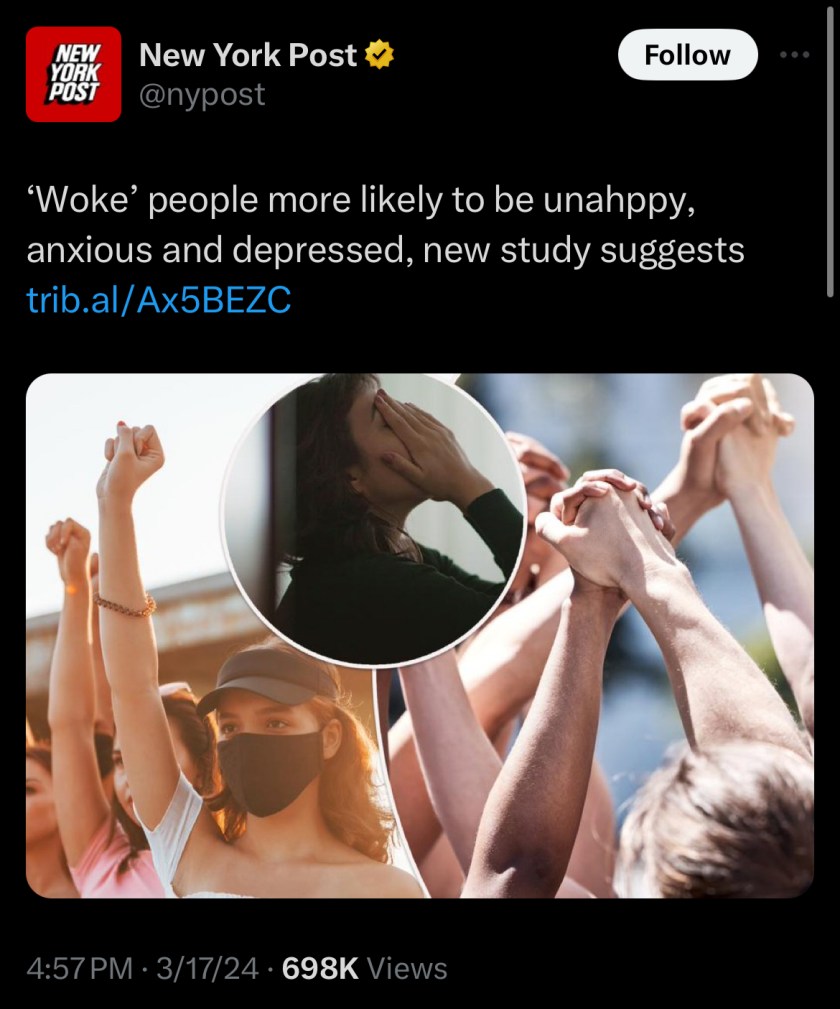“That’s the theme song from The Jeffersons. You really need help.” – Tropic Thunder

All these clock pictures sometimes tick me off.
- Those who have an opposing ideology are considered evil.
- People actively avoid being near those of opposing ideology. Might move from communities or states just because of ideology.
- Common violence. Organized violence is occurring monthly.
- Common violence that is generally deemed by governmental authorities as justified based on ideology.
- Opposing sides develop governing/war structures. Just in case.
- Open War.
Volume V, Issue 11
All memes except for the clock and graphs are “as found”.
This is a moving situation, and things are changing quickly. The advice remains. Avoid crowds. Get out of cities. Now. A year too soon is better than one day too late.
I’ve rolled back the clock this month. We’ll see if it holds.
In this issue: Front Matter – Variations on a Theme – Violence and Censorship Update – Biden’s Misery Index – Updated Civil War 2.0 Index – We Win – Links
Front Matter
Welcome to the latest issue of the Civil War II Weather Report. These posts are different than the other posts at Wilder Wealthy and Wise and consist of smaller segments covering multiple topics around the single focus of Civil War 2.0, on the first or second Monday of every month.
I’ve created a page (LINK) for links to all of the past issues. Also, subscribe because you’ll join nearly 850 other people and get every single Wilder post delivered to your inbox, M-W-F at 7:30AM Eastern, free of charge.
Variations on a Theme
During the month I collect headlines and other information that documents the way things are going – for me, it’s interesting just how quickly something either fades from memory, or becomes the “new normal” and becomes business as usual. The following (at first) seemed a bit disjointed to me, but in the end they all tell the same story – the story of the plans to eliminate the culture that now exits, and the desire to hold on to power, no matter what the cost.


Keeping that in mind, the election is coming up. Trump is leading and one major Democratic technique is to create an electorate split. The reason they want the power, is to use it.

And there’s a big population of businesses that are coordinating to “interfere” in the election. The GloboLeftElite always project what they are doing on their enemies. And, to them, we are not competitors, we are deathly enemies.

As has been a major theme on all media this, not just here at Wilder, Wealthy, and Wise®, illegal aliens oozing across the border has been the biggest story of 2024. The GloboLeft tries to pretend that they’re not in favor of this, but it’s abundantly clear that this is no mistake, not act of nature. This is entirely planned.



This policy stays either without respect to the consequences or, perhaps, because of the consequences. The consequences have significant negative impacts of the actual citizens here, including employment. They are helped by official at every level.


The consequences? Lawlessness and lowered competence.



The long term plan? Who knows?

There is sufficient proof that the GloboLeft hates God:

And that the GloboLeft is everywhere:

And that they worship death:

And don’t care about our deepest cultural beliefs:

And that they’ll put their, um, “money” where their mouth is since humans are apparently just TransCows to them:

Violence and Censorship Update
Several readers have reported to me (via email) that they were unsubscribed or that their subscriptions are filtered out as spam. FYI. Might it be random? Sure. It might. Heard about more this month.
I’ll (mostly) let the memes speak for themselves. Foreign stories are included as they often foreshadow attempts in the United States.
I did two stories this month on Sweet Baby Inc.’s looting of game companies for money and to insert GloboLeftElite propaganda into games to control your mind. Remember, never buy anything from a company that has a CEO that stole a hair style from Sideshow Bob on the Simpsons.

Here’s the playbook that Sweet Baby Inc. uses . . .

And the voice of someone who called them on it, and got doxed:

And (from the UK) what successful Social Justice looks like:

And the next few are the result of successful Social Justice policies:




And probably the plan:

And, Canada is seeing the end game in sight:

Here’s a bit more on that:

And the what the RCMP thinks of Canadians:

But March was also rich in Orwell:

Never forget, the GloboLeftElite will blame others for what they’re already doing:

And Canada showing they’ve figured out what a woman really is . . .


Biden’s Misery Index
Let’s take a look to see how we’ve done this month . . . .

Yup, up again. It’s like it’s planned:

Updated Civil War II Index
The Civil War II graphs are an attempt to measure four factors that might make Civil War II more likely, in real time. They are broken up into Violence, Political Instability, Economic Outlook, and Illegal Alien Crossings. As each of these is difficult to measure, I’ve created for three of the four metrics some leading indicators that combine to become the index. On illegal aliens, I’m just using government figures.
Violence:

Violence is down, expected in spring. Probably quiet until June or July.

Political Instability:

Up is more unstable, and it is slightly up.

Economic:

Economic numbers are near a high, but I wonder if it’s the drunk before the hangover?

Illegal Aliens:

Highest March. Ever.
We Win
To have a civil war, there have to be two sides. I think the goal of the GloboLeftElite has been to convince those who oppose it that the game is over. They have already shown themselves to be ready to do anything, absolutely anything to gain power. From then, they’ll pull up the ladder. What do they want?

- “Voting” so loosely open that anyone can do it. Think something as simple as obtaining a drivers license equates a ballot in the mail. Then, anyone can harvest those ballots and mark them however they want, with no accountability. This was tried in 2020, and works great for the GloboLeft.

- Combined with voting changes (first point) the GloboLeft is cramming illegals into Red States as fast as they can. Either they’re “voters” or an army. Neither of those is good news.

- They also want control of the finances so that they can wreck them. Why? I have no idea on this one. Perhaps the Elite just want to consolidate the power and own it all.

- Of course, guns have been the bug up the butt of the Left for, well, forever. They try to make up things, but the real answer is that guns prevent the GloboLeft from taking the country over. It is clear from history that killing children is not something that bothers the GloboLeft at all, as the GloboLeft are currently the world champions at kid killing.
People are waking up. They’re seeing the real Evil of the Left:

They’re seeing that Woke doesn’t help anyone:

They’re seeing the engineered replacement:

They’re seeing that a society without marriage is weak, at best:

They’re seeing that the elite want to enslave them:

Even the GloboLeftElite’s hand-chosen minions are seeing the damage:

The RINOs are being challenged:

And a real A.I. without censoring, can see what’s up:

We will win. Even 4Chan sees it:

Like I always say – the road may be tough, be we really can’t lose.

LINK
As usual, links this month are courtesy of Ricky. Thanks so much, Ricky!!
Bad Guys
https://twitter.com/ModernityNews/status/1767165884764709217
https://twitter.com/i/status/1765525665862795547
https://twitter.com/The_Real_Fly/status/1764308853095633224
https://twitter.com/EndWokeness/status/1764270162264416637
https://twitter.com/itshoggs/status/1764148239568191724?t=Yb1ucXfa2OWsweGarTyQiQ&s=19
Good Guys
https://www.youtube.com/shorts/QytMLIyq6Y8
https://twitter.com/RNCResearch/status/1768665733850902779
https://nypost.com/2024/03/15/us-news/nyc-subway-rider-who-shot-aggresive-straphanger-during-rush-hour-commute-wont-be-charged-prosecutors/
https://twitter.com/charliekirk11/status/1770624522150126010
One Guy
https://www.vox.com/2015/8/27/9212725/australia-buyback
https://www.news.com.au/national/northern-territory/carnage-alice-springs-anticrime-campaigner-robbed-in-sleep-during-alleged-home-invasion/news-story/c65d3e9c6039c328ee67039246507b23
https://youtu.be/YGz1Tiaying
Body Count
https://twitter.com/_BlakeHabyan/status/1763055020478464084
https://twitter.com/InfoUncensored/status/1757473606655729776
https://twitter.com/ResidentialClub/status/1774223963196973159
https://www.dailysignal.com/2024/03/28/most-believe-jesus-christs-resurrection-new-poll-finds/
Vote Count
https://twitter.com/CitizenFreePres/status/1764478200334168570
https://www.uncoverdc.com/2024/03/04/the-sad-state-of-marylands-voter-rolls-79k-inaccurate-records-found
https://americanmind.org/salvo/the-2024-election-will-be-neither-free-nor-fair/
https://newsbusters.org/blogs/free-speech/gabriela-pariseau/2024/03/18/41-times-google-has-interfered-us-elections-2008
https://www.lewrockwell.com/2024/03/lew-rockwell/how-the-democrats-plan-to-steal-the-election/
https://jonathanturley.org/2024/03/26/saving-democracy-from-itself-the-democratic-national-committee-moves-to-block-third-party-candidates/
https://www.judicialwatch.org/illinois-voting-rolls/?source=46&utm_source=t.co&utm_medium=social&utm_campaign=press%20release&s=15
https://www.zerohedge.com/news/2024-03-26/theyre-going-let-trump-win
https://www.newsmax.com/newsfront/mississippi-doj-elections/2024/03/13/id/1157105/
https://www.yahoo.com/news/nyc-council-asking-states-highest-221121732.html
https://news.yahoo.com/biden-building-superstructure-stop-trump-141631115.html
https://twitter.com/ScottAdamsSays/status/1771398655184171487
Civil War
https://www.theguardian.com/film/2024/mar/30/alex-garland-civil-war-interview
https://www.theguardian.com/film/2024/mar/15/civil-war-review
https://www.hollywoodreporter.com/movies/movie-news/civil-war-movie-timing-maga-violence-1235831454/
https://www.youtube.com/watch?v=fQOZ4KctZ0k
https://www.dailywire.com/news/harvard-accused-of-promoting-eco-terrorism-for-plans-to-screen-how-to-blow-up-a-pipeline-film
https://www.youtube.com/watch
https://twitter.com/WallStreetApes/status/1760394086274695385
https://tldavis.substack.com/p/complacent-about-replacement?r=1ggdo
https://tldavis.substack.com/p/the-fragile-state
https://victorhanson.com/american-paralysis-and-decline/
https://newrepublic.com/article/179966/four-2024-post-election-scenarios-trump

































































































































